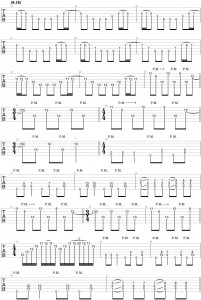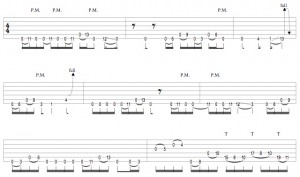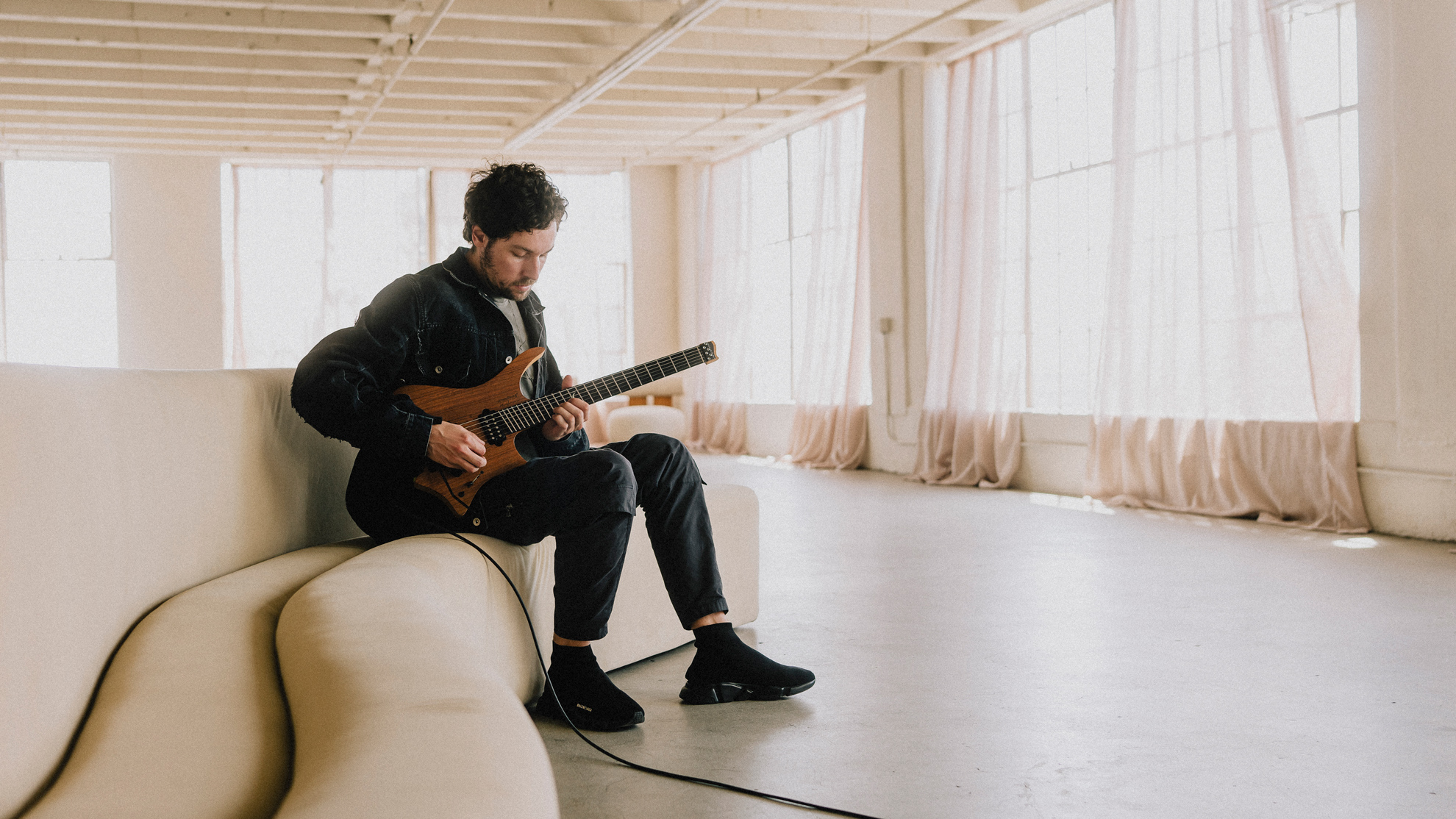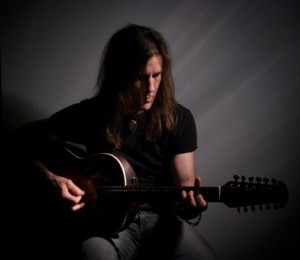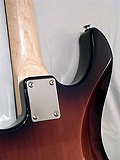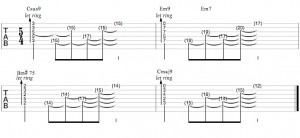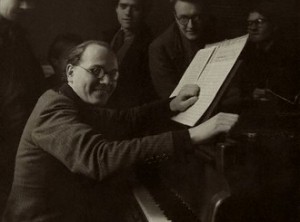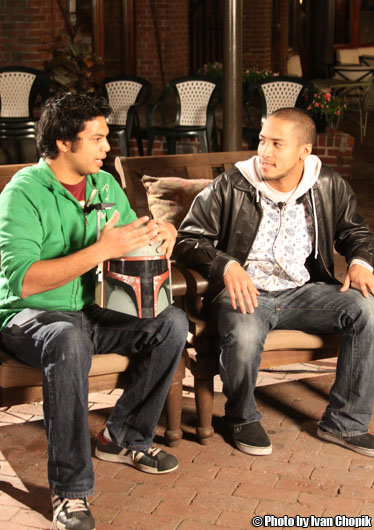
Misha Mansoor and Marc Okubo
We at Guitar Messenger already had plans to interview Veil Of Maya’s Marc Okubo, but once we saw the announcement of their tour with Periphery, we knew we had to do something special. So the thought occurred to us: what if instead of us interviewing Marc, we had Misha do it instead? Soon, what began as an interview became an in-depth discussion between these two titans of modern progressive metal.
Since their formation in 2004, Chicago’s Veil Of Maya have cultivated their dedicated following with non-stop touring and a passionate do-it-yourself attitude. In 2010, the quartet released [id], their third full-length record and second through Sumerian Records. Fueled by chief songwriter Marc Okubo’s lush, unorthodox riffing style, [id] further pushes the group’s jarring twist of progressive, thrash, and melodic death metal, while maintaining the rhythmically precise and harmonically dense sound that is Veil Of Maya.
We last spoke to Periphery founder Misha Mansoor in April of 2010, just before the release of the band’s celebrated debut album. Their blend of polyrhythmic grooves, complex harmonies and infectious melodies has earned them the respect of their peers and made a deep impact both within the metal community and beyond it. We met with Marc and Misha on the opening date of their tour with Darkest Hour and Revocation in Worcester, Massachusetts:
MM: I think I’ve officially played more shows with you than anyone else – probably not true the other way around. This is, what, round three for us?
MO: Yeah.
MM: We’re on tour with Revocation and Darkest Hour, and this tour is gonna rule. We haven’t even played our first show yet. How are you feeling?
MO: Nervous.
MM: Why are you nervous?
MO: Because we’re on tour with Periphery and Darkest Hour and Revocation. [laughs]
MM: Don’t drop the P, man. We have a song that we haven’t even practiced, so I’m more nervous than you are. But I’ve got my good friend Chewbacca here to help me out.
MO: That’s Boba Fett, dawg. [laughs]
CLICK PLAY ABOVE TO VIEW PART 1 OF 2 OF THE INTERVIEW VIDEO SCROLL DOWN FOR PART 2MM: You have a very unique approach to the guitar. You have to fill the role of two guitarists in your band. How do you approach that?
MO: I use effects. I use a harmonist to harmonize all of my riffs in key, and I use a loop station to record myself and play myself back. I also write a lot of riffs using pedal tones, so I can have a moving bass line that accompanies the riff within the riff already, so it kind of covers a lot of ground.
MM: What is your process for songwriting – is it something you do yourself? Is it something you do as a band, or in front of a computer or what?
MO: I do most of the writing by myself – a lot of it is in front of a computer. I like to sometimes write drum parts before I write the riffs, and then sometimes write riffs around that. A lot of times I get riffs stuck in my head, and the only way to really get them out is to apply them musically and record them.
MM: If I had to put bands that play our style of music into two categories, I’d say there’s the kind of band that gets in a room and jams together and really fleshes out their ideas there, and bands where they have members who write stuff and figure it all out, either on the computer or they have this master plan of everything, and it all gets done in the studio and you play it true to the recording. Where would you say you fit on that spectrum?
MO: I generally have a vision of what I want to hear for the song, and I’ll write and record it and then send it to our drummer and he’ll get comfortable playing it and then add his two cents to it. Pretty much the rest of the band, so far in our experience, has been chill with us doing it like that. No one really complains.
MM: That’s good, if you have your dynamic and it works. How do you come up with those crazy rhythms? Because there are some pretty crazy rhythms in your music.
MO: For me, if it’s going to be a part like that, a rhythmic, heavy part, it just doesn’t sound good to me unless it’s a certain way. I can’t play four bars of the same thing over and over again. It doesn’t fit for me.
MM: That’s good. It’s part of the unique sound.
MO: To write it, I do it a lot by writing it on drums first. That helps me.
MM: The drums and the guitar seem to be the main focal instruments in the band – they’re always locked in together, pretty much hitting notes at the same time, which is probably an aspect that we share in our styles of music. It’s very focused around the drums. As the guitarist, I need to hear that more than I need to hear myself.
MO: All I have through my monitor most of the time is kick drums, so that I can just follow that.
MM: Do you guys use a click live?
MO: We plan on doing that very soon. We don’t have our click tracks yet, but that’s all coming.
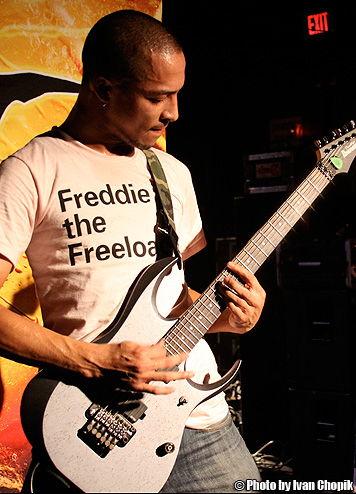
MM: So you guys just jam, basically. That’s amazing.
MM: Why don’t you tell me one of the biggest misconceptions about the road that fans may have about you or touring or being in a band?
MO: There are a few things. One of them would be making a lot of money – right now we have successfully managed to get to the point where we can make enough to eat, and that’s about it.
MM: That is more than most. [laughs]
MO: We’re really happy about that. That’s amazing for us, to not have to work full-time jobs when we get home. Another thing – a lot of people think that our bands get lots of girls. Have you ever gotten that before?
MM: [laughs]
MO: They’re like: ‘Oh, yeah. You guys get girls.’ I know maybe five girls that listen to our band.
MM: I think that’s another thing we have in common, man.
MO: Plus we’re the brown dudes.
MM: We are the brown dudes. I don’t know what the deal is, but we don’t get girls, really. Personally, I get a lot of – and I appreciate it, because I enjoy talking about gear and all – gear geeks and nerds like that, which is great because they’re just like me, so we talk about gear for way too long.
MO: Actually, a lot of gear dudes have been using this new saying – not what you’re thinking. A lot of dudes say that they jizz when they hear certain parts of our music, and it’s gotten pretty popular to say that to describe things they like.
MM: That is the most sexual thing that has happened to us on tour. That is as close to getting laid as we get, so that’s really awesome, keep it up, guys. I’d love to get some jizz action sometime myself.
MO: I don’t believe that you guys are all jizzing, but maybe you are. [laughs]
MM: Maybe 50% of jizzers are out there, and the other 50% are nursing a semi, working their way. It is definitely a different crowd. I definitely appreciate it though, don’t get the wrong idea, but it is definitely a misconception. You have to be a certain kind of metal band. Most of us have girlfriends, I don’t know about you guys.
MO: Yeah, our band has girlfriends.
MM: Is that hard for you on the road? Is it hard for them?
MO: Yeah, it sucks. Wouldn’t you agree?
MM: It does kind of suck. I do have to agree. That is probably the only thing that makes home home for me. Otherwise I’d be quite happy just living on the road. It’s good to come back to the girlfriend. And that’s probably a big reason why none of us really care right now if girls are hitting on us all the time. If we were single it might be a different story.
MO: Oh, it sucks. I’ve been in that boat before.
MM: It does suck. It’s a big sausage fest. Well hey, girls of GuitarMessenger.com, please start coming out to our shows. I know you’re out there.
MO: How do you go about writing your songs, usually?
MM: It’s usually in front of a computer, it’s usually very unexpected. I have a lot of trouble writing a song when I want to write a song – it sort of just happens, and it usually happens when it’s very late at night, which is really unfortunate, because I really wish I could write more during the day. I don’t know what it is, but it seems like as of midnight or so then all of a sudden an idea will blossom into a song.
It usually starts with one riff that I’ve been messing around with, and I’m like: ‘Okay, I should record it.’ Not all of the time, but when I get lucky, by the time I’m done tracking, I’m like: ‘Oh, I have a good idea for what should go next.’ That goes on until I have a bunch of riffs that kind of logically work with each other, and then sometimes I need to rearrange or arrange it at all, and sometimes I’m lucky enough to get an entire song or most of a song out of it.
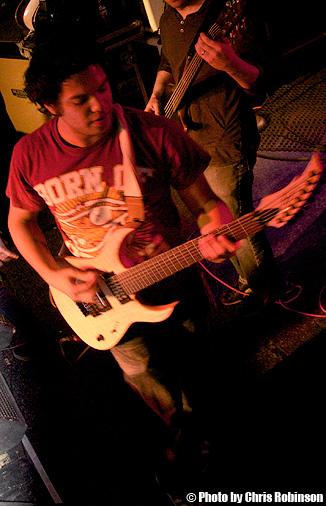 That’s usually been my process, and unfortunately for me I have no control over it. I feel like I’m a passenger watching process happen, because I can never induce it. It’s never like: ‘I haven’t written a song in a while, I really wish I could write a song now.’ It’s always like: ‘Oh, there’s an idea! I hope I have time to record it.’
That’s usually been my process, and unfortunately for me I have no control over it. I feel like I’m a passenger watching process happen, because I can never induce it. It’s never like: ‘I haven’t written a song in a while, I really wish I could write a song now.’ It’s always like: ‘Oh, there’s an idea! I hope I have time to record it.’
Actually, the shower – in the shower I always get riff ideas. I don’t know why. It’s annoying, because it’s usually at the beginning of the shower and so I have to actually shower, and try to keep it in my head and hum it until I get out, and then I’ll race to the computer half-naked and wet, trying not to get water all over the place and get the idea out before I forget. Some of the songs, like ‘Ow My Feelings’ off of our album – shower song, definitely. [laughs]
MO: That’s awesome, I’ve never done that. I get ideas on walks or something. Definitely nighttime, I get that, too.
MM: I wish it was on walks. It’s usually when I can’t have access to a computer, and I’m desperately trying to think of it in my head, like: ‘Don’t forget, don’t forget.’ Of course, I’m the most forgetful person ever, so five minutes later I’ve lost it. But it’s better to have loved and lost than… nah just joking. Yeah, I have no control over it. I always end up going to bed at like six am the nights I record a song. It’s pretty miserable, and I’ve been sitting at the computer for way too long.
MO: Your neck’s like this [hangs head forward].
MM: You feel like a zombie. It sounds pretty terrible, and it kind of is, but at least you have a song out of it the next day, which is cool, I guess.
MM: Marc, as I said, you have a really unique style. What has helped to develop that style? What are your influences? What would you say you draw from in the way that you play and write?
MO: I grew up listening to a lot of 70’s progressive fusion, jazz and rock. I was way into Chick Corea, Herbie Hancock and Mahavishnu Orchestra, then like Yes and King Crimson. That’s always been a huge step for me, my brain will always kind of think in that poppy yet technical sense.
MM: The interesting thing about those bands is that they do just that – they’re very prog, but they’re accessible. If you listen to that pretty early on, I feel like it’ll strip you of the boundaries of 4/4 or fairly straightforward groove music. Those bands feature a lot of syncopation, a lot of very strange chord changes and time signatures and all that to where it doesn’t seem that weird, as opposed to someone who’s been listening to Green Day, and not to diss Green Day, but if that’s what you grew up on you probably have a very different approach to guitar.
I grew up on Nirvana and Green Day and stuff like that, and I remember when I first heard weird time signatures – I just did not understand what was going on, and writing in weird time signatures was so foreign to me.
My brother, on the other hand, who’s younger than me, I made sure he got into really good music like Dream Theater, Guthrie Govan, Sikth and Meshuggah as well as the simpler, poppier stuff. I found that he would be writing his first songs not in 4/4 and with weird accents and chord changes, because he wouldn’t think of those things as limitations.
MO: Especially hearing you, too – growing up with you as his brother.
MM: When I was growing up, my songs sucked. [laughs] That’s where you started out.
MM: Where would you say you are now? What are you listening to and what’s influencing you?
MO: Right now, I’ve been pretty influenced by this dubstep DJ named Reso – I like him a lot.
MM: I’ll have to check that out.
MO: It’s hard to find good dubstep.
MM: Good dubstep is amazing.
MO: I like Röyksopp, I like Telefon Tel Aviv a lot.
MM: I love Telefon.
MO: Karnivool, I like them.
MM: Ah, Karnivool! I love that band. That band can do no wrong. Have you seen them live?
MO: I haven’t.
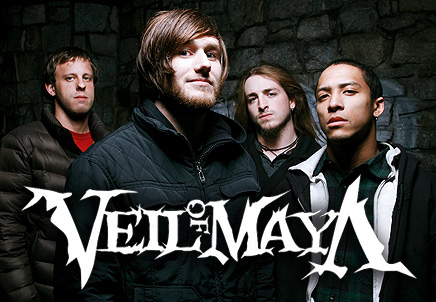 MM: Dude, most depressingly good live band. It really does sound better than the CD live. It’s amazing. [To audience] Go see Karnivool. Do yourself a favor, listen to their albums – my favorite is Sound Awake.
MM: Dude, most depressingly good live band. It really does sound better than the CD live. It’s amazing. [To audience] Go see Karnivool. Do yourself a favor, listen to their albums – my favorite is Sound Awake.
MO: Yeah, that’s the best one.
MM: Hearing that one from beginning to end – that’s a real album. You don’t put a song on, you put it from beginning to end and you listen to the whole thing, and even though it’s 70-80 minutes long, it goes by way too fast. Brilliant album.
MO: Definitely. Check that out.
MM: Anyway, didn’t mean to cut you off, but that was too good.
MO: It’s all good. That was totally necessary. Also, all my friends’ bands. We’ve done a lot of touring with you guys and Animals As Leaders, The Faceless, After The Burial and Born Of Osiris.
MM: There’s a lot of talent in metal these days. It’s really branching out with all of those non-metal influences.
MO: Not even always listening to each other’s music, but just the fact that we can all hang out. Playing more technical or strange kinds of music brought us all together at one point.
MM: I’ve had a few theories about this myself, and I should probably start by asking you: in your experience, have you found bands that you tour with to be chill? Have you run into a lot of egos or rockstars?
MO: I can say that I enjoyed touring with every single band that we’ve toured with, for the most part. There’s definitely some people that have more rock star attitudes than others, but if you can find a way to find a common interest besides talking about your band, then it’s just like anyone else in the world. Everyone can talk about Call Of Duty or something like that.
MM: It’s interesting, because in this style of music, we do have a lot of common ground. We are into a lot of the same things, and maybe it reflects on how we approached our instrument and how we developed, because it’s like a certain sort of mindset.
MO: We’re all close to the same age and we all heard a lot of breakthrough music at the same time. Obviously Meshuggah had a huge impact on all of us and then we all grew listening to them, as well as listening to all the other forms of progressive music.
MM: And lots of non-metal music, which definitely makes its way through in very interesting ways. The reason that I asked you that is because, in my experience as well, I’ve found that we haven’t toured with a band that we didn’t get along with. Bands in metal always seem to be so chill and so easygoing, and so easy to get along with. I think part of the reason, if I had to theorize, is that playing in a metal band is such a blow to your ego. You couldn’t get through one day of touring in a metal band and be a rock star about it, unless you were absolutely huge and making a ton of money. There’s nothing really glamorous about the daily life of a touring metal band.
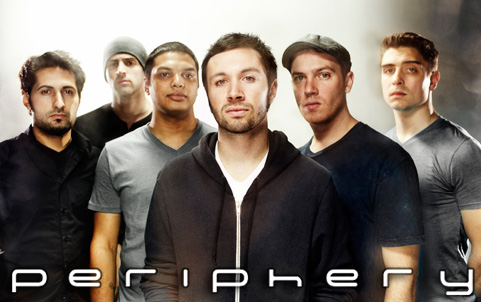
You guys are in a bus, finally, and that’s a huge step up. That’s something that we haven’t done yet that we would love to do someday, but even getting to that point is amazing, and I think that by the time a lot of bands make it to a bus, they’ve already been humbled so much by their experiences on the road that they’ll never let it get to their heads.
It is kind of interesting, but metal as genre breeds really cool level-headed people, because there really is no room for rock stars and they stick out kind of like a sore thumb and they don’t really last long in those bands when they are there.
MO: And generally, people that listen to our style of music typically have to search for bands. They don’t just get force-fed them off the radio or something. It’s a passion they have.
MM: And with YouTube, Myspace and Facebook, it’s much easier to network and find out about these bands – whereas before the Internet and all that, you had to have someone’s tape. Now in two seconds, you can check out…
MO: Dude, I remember going into an AOL chatroom and being like: ‘What are the most talented bands?’ and people would be like: ‘Rush! Dream Theater!’ I was like: ‘I have to go buy those CDs – Rush and Dream Theater, right now!’ I heard that, and I was like: [has mind blown] ‘Oh!’
MM: Nowadays, by contrast I’d never heard of Revocation before this tour that we’re doing. Literally, I just went on YouTube, typed in ‘Revocation,’ watched their music video, loved it and just went to their Myspace and listened to everything on their Myspace, and I was like: ‘Wow! This band’s awesome.’
It took me about ten minutes flat to really start digging this band I’d never heard of before. In some ways, maybe that makes it less of a connection, but in another way it makes all of these bands accessible. I think metal is really on the rise because of it. It used to be a real subgenre, and now you find a lot of people are into metal.
MO: Yeah, regular people are into it.
MM: Marc, what are your plans for the future?
MO: I want to outdo everything we’ve written so far, and make our next album over the top.
MM: That’s a tall order, because I think that [id] was that amazing step up from The Common Man’s Collapse. It was very mature, very well arranged and very well thought out. The riffs all have their logical place and everything flows, which is such an important thing to me – arrangements and how songs flow. I feel like a lot of bands nowadays tend to just jam really cool riffs together with no sense of purpose. It’s like: ‘Why is this riff here?’
I feel like on [id], there’s this real sense of: ‘This is a song. This is a really good song.’ It has impressive parts, but you almost start to take the impressive parts for granted, because you’re just listening to the song as a whole rather than Cool Riff 1, Cool Riff 2, Breakdown. It starts to become it’s own entity, which is personally what I enjoy in bands and what I look for. So you’re definitely on the right path, because I know that you are personally one of my favorite guitarists out there, because you are so creative in your approach and you just write ear candy for what I like to hear. I think we have a very similar sense of what sounds good.
CLICK PLAY ABOVE TO VIEW PART 2 OF 2 OF THE INTERVIEW VIDEOMO: You’re one of my favorite guitarists, too.
MM: Aw, you don’t have to say that. I think if you just continue in that direction and continue progressing and maturing in the way that you did between those two albums, your next album is going to be, like, perfect. It’s going to be by far the best thing you’ve ever done.
MO: I’ll be showing you clips. You’d better give me some advice.
MM: [To audience] There you have it. If I don’t get them, you know who to talk to.
MO: What about you guys, though? You guys have new stuff.
MM: We’re always working on stuff. We have an EP that we actually pretty much just finished – we’re doing some final tweaks on it. It’s going to be a bit of re-worked stuff from the album, a bit of stuff that was very hard to get, like some of the imports and b-side tracks that were basically impossible to get with re-worked vocals so they sound much better and some new stuff, too.
We’re doing this remix competition. We’re putting it out there for someone to remix our song ‘Icarus Lives,’ so the winner is going to be on our EP. [Also,] we are working on our second album, which is pretty much written for the most part.
MO: What!?
MM: Because we have too much material.
MO: Didn’t your album just come out a few months ago?
MM: We have way too much material. I’m trying to get all of the old stuff out, so I can really start working on new stuff. There will be some new stuff on this, too, so it’ll be a mix of old and new. We have too much material for traditional album cycles, so this one’s probably going to be loaded to the brim, as well. It’s a nice long album and EP. We just wants lots of music out. I just want to work on new, new stuff.
MO: That’s the right kind of mentality. Our fans also have extreme ADHD, like really, really bad. That’s why they’re into our kind of music. [laughs]
MM: A month after our album came out, they’re like: ‘So when’s the new album come out?’ I’m like: ‘We released it a month ago.’ They’re like: ‘Yeah, yeah.’
MO: It’s like: ‘It only took me like ten minutes to write that last album, so I’ll just do another one.’ [laughs]
MM: It’s quite a process doing an album. It’s stressful, but I just want to get it out. I don’t think any band looks forward to going into the studio, they just look forward to the end result. The studio’s so stressful. Doing the Periphery album, for me personally, was one of the most stressful things I’ve ever done in my life. Would you agree with that sentiment with your last album?
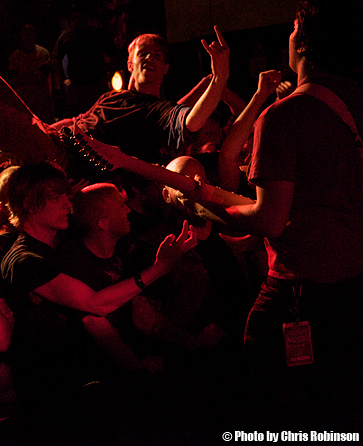
MO: Yeah.
MM: I know that you were on a tight, tight schedule.
MO: Writing it, it was like: ‘Are we really going to record? Yes, we are.’ So it’s like two months to put it all together.
MM: When you’ve got deadlines on it, it just starts becoming really stressful. [Triggers laser noise on Boba Fett helmet.] WHOA. I discovered a button on this.
I know we were talking about the fans being ADD, but look! This is about Boba Fett right now. What is it saying? Alright, and back to where we were…
Some people use names like ‘djent’ and ‘Sumeriancore’ to describe your music. What are your thoughts?
MO: We would just like to say that we hate you. [both laugh]
MM: Well, I’m just kidding and we are the same person since we’re both brown, so I just cancelled out what you just said.
MO: Oh, dammit. [laughs]
MM: But seriously, I don’t think any band is a fan of a label. I work so hard, and I know this guy works so hard to try to do something that sounds good and sounds like ourselves. Of course people like to label things into tiny, neat packages – that’s the way it fits in your brain with all of other things you got up in there.
I can’t say that I’m a fan of any one of those terms, just because it kind of narrows what is expected of you and what you can do. It’s kind of a way to limit what you sound like. Sure, if someone wants to know what you sound like in three words, then there you go. But chances are, you’re going to listen to the music and be like: ‘Oh, that’s not necessarily the best word.’ If I had to describe our music in any way, I’d say ‘progressive metal.’ That’s probably the most broad term for it.
MO: Metal or progressive metal.
MM: Aggressive progressive music. Progressive aggressive, there you go. That even has some sort of rhyming scheme going there, so we can go with that.
MO: The thing that bothers me the most is that those terms weren’t invented until after all of us were bands. We all started our bands before we knew each other, too. None of this was intentional.
MM: We weren’t like: ‘Hey, let’s be a Sumeriancore band, just like that band that is not signed to Sumerian yet, but will be when we are. [laughs]
MO: Yeah, exactly.
MM: It didn’t happen like that, and it’s interesting, because I look at the bands on Sumerian, and they all sound very, very different to me. I love them, because they’re very talented, but they all sound so different. So lumping them into one category maybe as a broad term, but I don’t even know exactly what that means, other than that you happen to be signed to Sumerian Records.
MO: I’m proud to say that we have a good label that is very selective of the bands that they sign and isn’t only looking out for profit. They’re signing new, unique talented bands that are doing something new with genre. I think the fact that they got a good majority of the bands that are doing something new with it, people started labeling it as a subgenre.

MM: Then there’s this Djent thing…
MO: That’s all you, man. [laughs]
MM: I get blamed for this. I didn’t even come up with the word. I’ve said this a million times, but Fredrik from Meshuggah came up with it. I used to post on the Meshuggah forum, and that’s where I picked up the word – people were describing guitar tone. It’s just a palm mute that you pick really hard, and I really like the way it sounds. It sounds metallic – it’s like: ‘Djent! Djent! Djent! Djent! Djent!’
MO: Is that the one where they stack the power chords with four notes?
MM: Yeah, where you play four notes on the power chord.
MO: I remember reading that now.
MM: That’s where the term originated. I was looking for gear that was djenty. I was like: ‘Are these pickups djenty?’ For some reason it caught on, but completely in the wrong way, because people think it’s a style of music and they think it’s a style of music I play. There’s a misconception, because low-tuned open-note syncopated riffs are now called djent riffs, even though it has nothing to do with it. A lot of djent bands don’t even play that djent chord or even do that sound, so it’s very ironic how that worked out.
MO: You just blew my mind right there, I just had a vivid memory – you know None by Meshuggah, that EP? It has a song that’s like: ‘Da-da-duy-da-da-duy-da! Da-da!’ There’s one part that’s like: ‘DJENT!DJENT!DJENT!DJENT!’ He’s playing a guitar solo over it, and it sounds like he’s saying ‘djent.’
MM: Do you know the song ‘Aztec Two-Step?’
MO: ‘DJENT!DJENT!DJENT!DJENT!DJENT!’ [laughs]
MM: It’s like: ‘Listen. DJENT!DJENT!DJENT!DJENT!DJENT!DJENT!DJENT!’ [To audience] Do you want to hear what djent actually is? That is what it actually is.
MO: [To audience] Get None by Meshuggah right now.
MM: Which you should have anyway, if you have a pair of ears and a soul.
MO: It came out in ’94 or something.
MM: It came out probably before a lot of you guys were born, before I was even born myself. That term is very limiting, because I feel like a lot of bands just focus on that open-note, syncopated sound. I know that neither you nor our band does just that. It is part of our sound, and it’s a sound I like a lot, but I wouldn’t want to limit my band to any one sound. If anything, with our debut we tried to cover as much ground as possible, so in the future we could expand in many other directions and it wouldn’t be weird. You guys have expanded a lot on your sound.
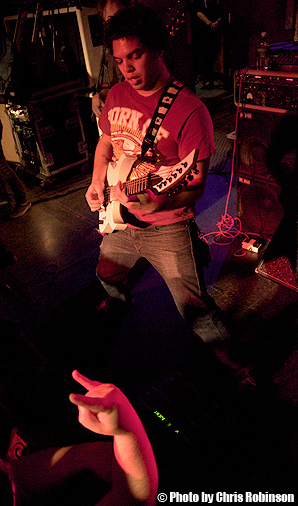
MO: We did that, too.
MM: That’s because no musician wants to be to any one thing, at least in my opinion. I wouldn’t want to have to write one style of music for the rest of my life. So that’s why those labels don’t really apply – because neither in our past work, nor in our approach to future work are they extremely relevant in any way.
Where do you see yourselves five years from now?
MO: We’re going to be holding hands on an island with 14 brown children. [laughs]
MM: 14 brown children who will look exactly like both of us, and we won’t even be able to tell them apart, because we know that we all look the same.
MO: They will write all of our music for us.
MM: They will write all of our music, and we’ll just kind of chill out. I don’t know where I’ll be in five years. That would actually be pretty good to be there five years from now – it probably won’t end up being that good. I don’t know, what are your goals five years from now?
MO: I don’t think I’m going to stop making music, regardless of what genre it is that I’m writing.
MM: I think that’s kind of a given, especially for someone of your talent. You were obviously put on this earth to play guitar and to write music. I don’t know about you, but me personally, that’s the only thing I’m halfway decent at. Everything else in life…
MO: I’m not even good at video games, really. I love them, but…
MM: Yeah, I enjoy video games, but I’m terrible at video games. I feel like this is the only thing I’m halfway decent at, so it’s really the only thing I could do and enjoy. If I wasn’t doing this, I’d probably just be trying to do this.
MO: Yeah, I’d be working at a job I didn’t like thinking about doing this everyday.
MM: That’s pretty much my take on it, too. So we’ve agreed that we’ll do music five years from now, maybe possibly collaborate at some point. How about we make that a goal? [to audience] What do you guys think? [audience cheers] They even want it. Did you hear that? That’s great! And just hopefully progress and be further up the ladder than we are now. It would be nice to do this for a living and not have to work a job when you get home. I don’t know if you have to work when you get home.
MO: I don’t anymore. I have very cheap rent in my apartment.
MM: No one in a metal band lives a very glamorous home life. It’s just in between tours. If my band could be at the point where we don’t have to work and we could make enough to get by and this would be our job, a legit job – we’d take home money every year – that would be an amazing five–year goal for me.
MO: I think as soon as you drop that EP, things are going to be very different for you.
MM: We’ll see.
MO: Your debut album sold a lot. That’s amazing for a debut album.
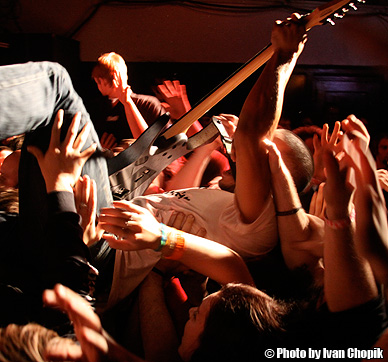
MM: Yeah, I don’t know how that happened. Thank you, forum and online people, for supporting us. You’ve helped us come a long way, seriously.
MO: Yeah, definitely. That’s why our genre of music is doing anything.
MM: It’s because of the Internet, it really is. It’s kind of an internet genre – that’s the game changer right there.
MO: Even torrenters. If you’re downloading our CD, you’d better show everybody you know, or else I’m going to be upset about it.
MM: Don’t torrent it and keep it for yourself. The least you can do – and of course our label’s not gonna like this… sorry, Sumerian. To those who are going to torrent no matter what: first, please do buy the album if you like it. It would be nice to get a little bit of support there. Please come to shows and talk to us and buy our merch, because that’s a lot of help, too, and please spread the word, because that’s the most important thing.
If you’re going to download an album, and you’re not going to pay for it and you’re not going to support in any other way, the very least you can do is spread the word about us. That way it’ll probably get around to people who will spend money on us.
MO: I just remembered – another generalization is that bands don’t make any money off of album sales. Kids are like: ‘They don’t make any money anyways.’ That may be true with certain labels, but our label takes care of their bands. They want their bands to survive.
MM: So it actually does make a difference for us. Next time that you’re thinking: ‘I’d rather just do this or whatever, because they probably won’t see any of the money.’ It’s not true, we will see the money and it does help us. As much as I love giving music away for free, and I do – go to my SoundClick: www.soundclick.com/bulb and you can download 150 songs for free, I love it – but to be able to support this career and to be able to afford to make more music in the future, we need to have some standard of living and I think that’s a misconception there.
People seem to be on either side of the fence, like it’s a black-and-white issue, like: ‘All you care about’s money. You’re just selling out. You should give it away for free.’ Somewhere in the middle – I like giving music away for free.
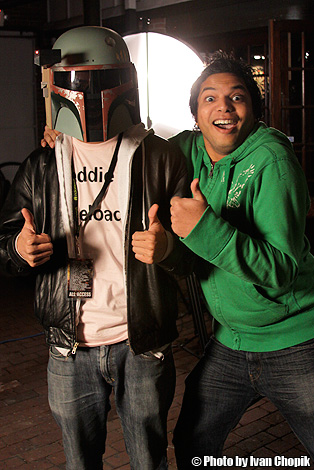
I don’t like charging for music, but at the same time, in 2010 there’s no realistic way for me to consider making a living without an album out that’s for sale and selling merch. So that really does help support us to carry us over to that next album and the next stuff that we’ll release.
MO: Say you’re a band that people are downloading, but maybe you’ve sold 100 CDs your first week. If you’re trying to get on big tours, people look at numbers to get you on big tours. If you want to see bands that you support, then buying their CD helps them get on to bigger tours. It’ll increase your chances of seeing them live.
MM: It really does help.
What advice can you give to younger aspiring artists?
MM: We are younger guys ourselves. Look at us. You like what you see? Come talk to us about gear. [laughs] I know there’s a lot of advice that I wish I’d had when I was younger. What would you tell a younger self?
MO: One thing I notice about some young musicians is that they have this attitude where if they can’t do something right away, then they just give up on it. It’s hard to stay motivated, but the can’t-do-it attitude just is not going to fly.
MM: Not in this industry.
MO: If I can’t do something, I will stay up for three weeks every day trying to learn how to do it.
MM: That’s the difference between the people who make it and the ones who don’t. They always say practice makes perfect, but I think the other half of that is persistence. It is tough, in any capacity. Not just learning the songs, but touring can be really hard. Aspects of touring and being on the road and being in a band can be very stressful. You have people who quit after that, and those are the ones who don’t last, and then you have people who persevere, and those are the ones who do. So that is definitely very good advice: stick with it.
[Special thanks to: Chris Robinson of Infinite Descent for his top-notch camera and animation work, and Cigar Masters of Worcester, MA for their warm hospitality.]




